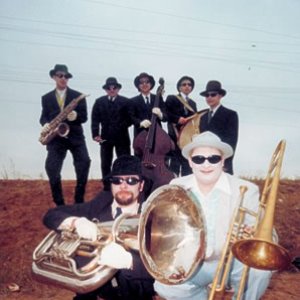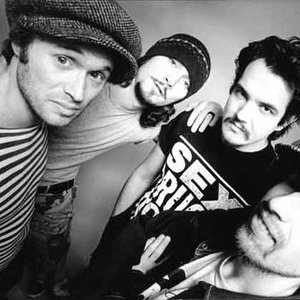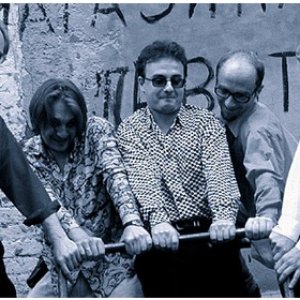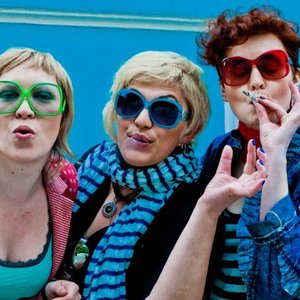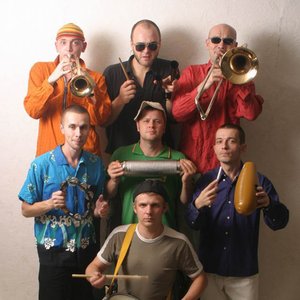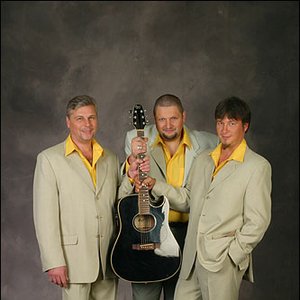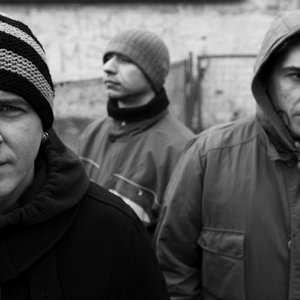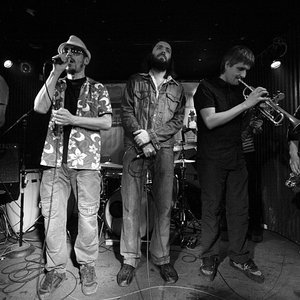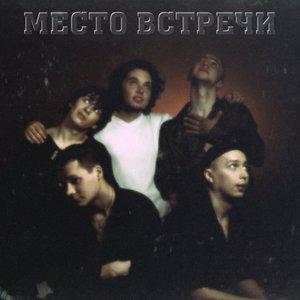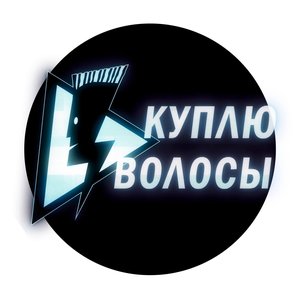Biography
-
Years Active
1990 – present (34 years)
1988
Vadim Pokrovsky and Anton Belyankin, Dva Samaliota's two cofounders, meet.
Pokrovsky was an ardent fan of art-rock bands such as Yes and King Crimson since 11, and got interested in world music because of ethnic excursions of David Byrne and Peter Gabriel.
Belyankin was into punk rock. Apart from British punk, New Wave and ska bands such as Madness, he liked St. Petersburg's own ska pioneers Stranniye Igry (Strange Games).
The idea of forming a band occurred to them when the two bought the same Cuban record of folk music at the same day, independently. They met then at Pokrovsky's home and tried to imitate Cuban rhythms all through the night.
1989
The home duo of Pokrovsky (vocals, guitar) and Belyankin (bass) becomes the band Dva Samaliota. Drummer Mikhail Sindalovsky joins.
Pokrovsky and Belyankin rehearse as a band called Polyoty Na Lunu (Flights to the Moon), but have difficulty finding a permanent drummer. One of the early drummers, Yevgeny Belyayev, has lately become well-known as DJ Udjin.
Eventually, Belyankin invites Mikhail Sindalovsky, then the percussionist with the pop-funk band Brillianty on Nekkermanna, and rehearse with him from October.
1990
Dva Samaliota joins the legendary Leningrad Rock Club and embarks on its first tours and take part in its first festivals.
In February, Dva Samaliota joined the Leningrad Rock Club, the union of rock musicians whose members include the famous Akvarium, Zoopark and Kino. At the audition the band performed as a trio of Pokrovsky, Belyankin and Sindalovsky. The songs' Russian lyrics were written by Belyankin.
In March, the band embarks on its first tour - to Sovetsk, Kaliningrad Oblast.
The first gig of notice at home took place at the Novaya Muzyka (New Music) festival promoted by Innokenty Volkomorov of the band Postoronnim V at the Polytechnic's club on May 19.
Alexei Lazovsky, the guitarist of the punk band Total Jazz Band, joined Dva Samaliota on tenor horn in October, later to switch to trombone.
Next, Denis Medvedev, of the pop-rock band Znaki Prepinaniya (later to become Prepinaki), joined Dva Samalyota on saxophone. For several months he plays in the two bands, but from summer 1991 becomes a full-time member of Dva Samalyota. After a while, he switched from saxophone to keyboards.
In December, Dva Samaliota performed at writer Alexander Zhitinsky's Avrora festival and the Indian Summer festival in Pasvalis, Lithuania.
1991
The band tours extensively, adopts its trademark nonsense language and records its first songs.
In March, Dva Samaliota took part in the Eighth Leningrad Rock Festival, which was dedicated to the 10th anniversary of the Rock Club and were awarded the title "Hope of the Leningrad Rock," quite a breakthrough for a new local band.
Dva Samolyota's song found itself on the festival 4LP live compilation, "Odnazhdy v rok-klube:" (Once at the Rock Club). By the festival the band's repertoire was entirely in Pokrovsky's quasi-African nonsense language.
The band arrives with the legend of Pokrovsky's early years in Kenya and deceives the press that the "language" he sings in is Swahili.
"I wanted to show to people in this country that there is music," says Pokrovsky. "People's ears here are tuned in such a way that they listen to the words first. That's why I decided to choose not to have at all - to have mood and a bare emotion."
The band is noticed by television producers and invited to Ostankino in Moscow to record several tracks for the television show Chyortovo Koleso - the recordings are known as the "lost" album "Kroshka Lu, Pronzayushchaya Serdtsa." (The title track would appear on a CD-version of the band's debut album in 1994.)
Later the same year, Dva Samaliota started to record its debut album "Kogda Poyot Dalyoky Drug," or "When a Far Friend Is Singing." Recording sessions were sponsored by Akvarium's bassist Alexander Titov, the then manager of Dva Samaliota.
In autumn, the band takes part in Les Allumees, the large-scale festival of St. Petersburg music and arts in Nantes, France. During the journey on the boat Professor Khlyustin, the band gets acquainted with Yasin Tropillo, the nephew of the famous producer Andrei Tropillo.
Yasin Tropillo went to Nantes as a sound engineer of the folk-punk band Nol, but due to the growing inadequacy of Nol's frontman Fyodor Chistyakov leaves for Dva Samalyota.
The other festivals Dva Samaliota took part in 1991 include those in Moscow, Mirny, Riga, Vilnius, Tallinn, Novgorod, Tula and Kaliningrad.
1992
Dva Samaliota acquire foreign fans and tour extensively abroad, and when home continues to record its debut.
Meanwhile, manager Titov is replaced by Arkady Volk, formerly a stage worker for Boris Eifman's Contemporary Ballet.
In May, Dva Samaliota takes part in the Printemps de Bourges festival in France. The trip turns into a 28-date tour over the country including a sell-out gig attended by The Ramones.
After France, Dva Samaliota goes to Canada to take part in the Montreal 350th Anniverary Festival and also performs at African Nights festival there. On its way home, Dva Samaliota visits New York, plays a couple of gigs at S.O.Bs and record a few songs at the R.P.M. Studios with bassist Will Lee, the popular session player.
The recordings which include the English-language version of "Bambula" with Lee on vocals are yet to be released.
1993
The debut album is at last out, Dva Samaliota starts to record the second. The band wins at the Pokolyeniye-93 (Generation '93) pop competition in Moscow.
The band's first album, "Kogda Poyot Dalyoky Drug," comes out on vinyl on the label Aprelevka Sound in Moscow (3,000 copies were printed). The band encounters difficulties in distribution because the public is only buying vinyl records reluctantly by then.
The band decides to release its next album on CDs and start recording what would become "Ubiitsy Sredi Nas" ("Murderers Among Us") at Andrei Tropillo's studios in St. Petersburg. Yasin Tropillo is a producer.
Dva Samaliota takes part in "Generation '93" contest and won the Grand Prix - an opportunity to make a professional video on Arts Pictures. The new version of "Bambula" was chosen for the video, directed by Stepan Mikhalkov with assistance of Alexander Solokh and some help from Fyodor Bondarchuk.
Dva Samaliota continues to tour abroad, the most memorable performance being the band's set at Love Parade in Berlin, Germany in November. Love Parade.
1994
Dva Samaliota moves to Moscow. The St. Petersburg band is in demand at Moscow clubs, fashion glossies and television.
The band releases the second album, "Ubiitsy Sredi Nas" (Yasin Records), and an extended version of the band's debut (Laserfilm), the both on CDs.
The video "Bambula" is in heavy rotation. Dva Samaliota frequently appear at television shows such as "S Dobrym Utrom" and "Goluboi Ogonyok". Pop singer Alyona Apina mentions she would like to perform with the band.
On the peak of its national popularity, the band moves to Moscow, becoming one of the most popular club bands there.
Dva Samaliota was noticed by Alexander "Ptyuch" Golubev, the owner of the then hugely popular Ptych magazine and club, who finances the recording of the band's third album.
"We lived in Moscow, and in an attempt to make money St. Petersburg promoters invited as as a 'Moscow band'", says Sindalovsky.
1995
Dva Samaliota continues to perform a lot and embarks on a civilizing mission as club promoters.
In May, Dva Samaliota performed at the first Maxidrome festival in Moscow, but at home in St. Petersburg was dismissed by hard-rock band DDT's rock festival because DDT's Yury Shevchuk thought the band was "pop."
"Pop singers considered us rockers, and rockers like Shevchuk considered us poppers, while we were trotting our own path," says Sindalovsky.
The band embarks on another tour to France, and then goes to a sea cruise with pop stars and Nueveau riches, which culminates into a concert called Bambula on the Canaries.
Upon coming back in August, the band takes part in launching the Nora Culture Club and forms its art program. The club promotes techno parties, alternative fashion shows and unplugged concerts.
1996
The band faces show-biz problems, yet launches an extremely successful club project.
Nora's owners fire Dva Samaliota to manage the club themselves, and after the farewell party in January the club quickly decays and eventually closes. The third album, "Pchyoly I Myod" ("Bees and Honey"), is finally out on Moscow's RDM label, which paid the band with 25 copies of the CDs and did not do anything to promote the album.
However, the year's main event was the new Griboyedov club, launched by the band in a former nuclear bunker on October 18. Since then, Griboyedov is defined by the energy and charisma of Dva Samaliota who turned the club's existence into a ceaseless creative process.
The club promotes avant-garde exhibitions and happenings, literary readings and parody disputes, while live gigs range from Afro-Carribean-style band Markscheider Kunst to Britpop-influenced Multfilmy. Griboyedov occupies an important part in the history of many popular local bands, including Leningrad.
1997
Dva Samaliota hosts television and radio shows. With Pokrovsky's departure, the bands survives the crisis. Pokrovsky is replaced by guitarist/singer Grigory Sologub, formerly of the legendary local ska band Stranniye Igry.
Belyankin and Lazovsky appear as hosts of the television show "KaMyShi," devoted to contemporary music, alternative fashion and visual arts. The show would exist until spring 2002. With Denis Medvedev as DJ Redisco, the duo also hosts a radio program "Discomport" on PORT FM. The band's activities also include video circle Sika M and "microalmanac" Pam Pers.
The crisis breaks when frontman Pokrovsky quits due to a drug problem.
Medvedev performs and tours with the band NOM, whom he helped to record the album "Euro" as the keyboard player and arranger. Lazovsky also does not take part in the band's activities.
The remaining Belyankin and Sindalovsky announce that "the band is going on a sabbatical."
In July, the duo attempts to reanimate the band by inviting Grigory Sologub, formerly of Stranniye Igry (Strange Games), Igry (Games) and Dolphns. Gradually Medvedev and Lazovsky return.
Next month, the new lineup starts recording songs to Russian lyrics by Belyankin.
1998
Dva Samaliota records its new album and performs its new material at concerts.
On money borrowed from a friend, the band finishes its "Latin" album "Don Pedro, Gomez i Mamochka", or "Don Pedro, Gomez and Mummy", which was not released on time due to the financial meltdown in August.
Using its old contacts, Dva Samaliota played in Moscow and in Finland. At the same time, Belyankin, Lazovsky and Medvedev played in joke band Selyodka (Herring) which they described as the "worst band in the world."
1999
The "Latin" album is at last out, Dva Samaliota starts to record the follow-up.
After the three-year hiatus, the band releases its fourth album, "Don Pedro, Gomez i Mamochka" on the independent label Zvezda Records in St. Petersburg.
The lineup is augmented by Alexei Kanev on saxophones and Andrei Kogan on trumpet.
Funded by the Rabochy factory, the band recorded its fifth album, tentatively called "Pisets '99."
2000
The band makes its new breakthrough with its new album, now called "Podruga podkinula problem," the title song is in heavy rotation on MTV Russia, Pokrovsky returns.
U.S. entrepreneur Paul Fields became interested with Dva Samaliota when he heard its 1994 album "Ubiitsy sredi nas." Having persuaded the band that the album should be released in the U.S., he came to St. Petersburg and met the members who took part in the recording, including Pokrovsky.
After signing a contract with Fields, the band received an advance payment of $5,000. For his share, Pokrovsky bought a guitar and resumed his music activities. The album is yet to be released in the U.S.
Meanwhile, Moscow labels were not interested in the band's new album, which was renamed "Podruga podkinula problem," or "My Friend's Dumped Her Problems On Me," by then, until the song's video won MTV's Russia competition and found itself in heavy rotation.
Moscow's big label Real Records offers a deal and releases "Podruga" on CDs on November 28.
By then, Pokrovsky was already back in the band, first performing alongside Sologub, but later Sologub quit. The band appeared at a couple of stadium festivals.
2001
Dva Samaliota writes new songs.
The band stops performing and fully dedicates itself to composing songs. From August 2001 to February 2002, 20 new songs were written.
Meanwhile, Griboyedov won the Nightlife Awards as the "Best Underground Club."
2002
Dva Samaliota records a new album and gets ready for a new breakthrough.
On March 11, the band started to record a new album called "A vy-to kto?" (Who Are You?) - with a new sound on its own studio. Apart from new material, the album is going to include rearrangements of several old songs, both well-known and never published.
In July, the band shot a video of "A vy-to kto?" (Who Are You?), the album's first single, which premiered on MTV Russia on October 14.
Artist descriptions on Last.fm are editable by everyone. Feel free to contribute!
All user-contributed text on this page is available under the Creative Commons Attribution-ShareAlike License; additional terms may apply.


